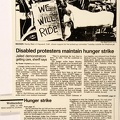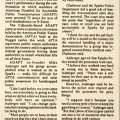Two different articles included here
Wednesday, April 12, 1989 Las Vegas Review Journal p7B
[Headline] Handicapped protesters refuse food in Sparks
Associated Press:
SPARKS — Handicapped demonstrators who have been jailed as a result of their picketing outside a gathering of public transportation officials are now refusing to eat, Washoe County Sheriff Vince Swinney said Tuesday.
Swinney said 30 people serving three-day sentences are only drinking water but won't take any meals.
About 75 members of a national group calling itself The American Disabled for Accessible Public Transit have been demonstrating outside the Sparks Nugget, where the American Public Transit Association is holding its regional meeting.
The protesters contend the transit association is not doing enough to make it easier for people in wheelchairs to gain access to public transportation.
Swinney said he realizes the handicapped face a number of barriers, but called the demands the demonstrators are putting on the sheriffs office, on police and on the courts an “inappropriate use of the criminal justice system to educate the public to what is a public problem."
He said he doesn't know how much the overtime and extra staffing is going to cost Sparks and the county.
Swinney and the jail were to have been the target of a Tuesday news conference called by protest organizer Mike Auberger of Denver, who earlier said the jailed demonstrators had not received proper medical treatment.
But Auberger said most of the problems at the jail were worked out in a two-hour conference with officials.
Swinney said the jail has brought in an extra doctor with expertise in helping handicapped patients and has called for additional nurses who can work with the handicapped.
Meanwhile, Swinney said the inmates' hunger strike is causing him concern over one of the prisoners, a woman with a history of seizures brought on by a chemical imbalance when she doesn't eat.
The sheriff said most of the protesters are serving their three days in regular cells or the infirmary because the jail has only two cells for the handicapped.
Forty-nine people were arrested Sunday and while most were not fined or jailed, they were told not to get arrested again. Those who were among the 25 arrested on Monday received sentences and fines of $265 to $315 in exchange for their guilty pleas.
end of article 1
Reno Gazette-Journal Thursday, April 13, 1989
[Headline] Most handicapped protesters decide to remain in jail
By Susan Voyles/Gazette-Journal
Sparks Municipal Judge Don Gladstone late Wednesday offered to release 30 jailed handicapped protesters if they pay $100 of their fins and promise to pay the rest later.
Two accepted the offer, but Mike Auberger, leader of the American Disabled for Accessible Public Transit (ADAPT), said he doubts many other members of his group will.
The prisoners are entering their third day of a hunger strike in the Washoe County jail today in protest of sentences by Gladstone they claim are too harsh.
The 30 protesters were arrested in demonstrations held on Sunday and Monday against the American Public Transit Association, which ended its western regional meeting at John Ascuaga‘s Nugget on Wednesday. ADAPT is picketing the transit group because many of its members operate public bus systems that do not have lifts for wheelchairs.
Of the 30, 27 pleaded guilty or no contest to charges of obstructing sidewalks and fire entrances. Most of them were sentenced to three days in jail, which would end today or tomorrow, and given $580 in fines.
Gladstone said he will allow them to pay $100 in fines each if they promise to pay the rest later in installments or do community service work in their home towns.
Auberger said his group has only $500 to pay the $3,200 in fines needed to release the group. Those arrested would have to sit in jail for another 23 days in order to pay off their fines, which are reduced at a rate of $25 a day.
"But I wouldn't be surprised if they say they'll serve the days rather than give them any money," Auberger said.
Auberger and others said Sparks is the only city where the handicapped demonstrators have been jailed for such offenses as obstructing sidewalks.
Pat Gilbert, a Reno attorney, was to meet with the 30 protesters Wednesday night to see what they want to do. Gladstone was prepared to hold hearings in the jail to begin releasing them.
Two people already have been released for medical reasons after receiving treatment at local hospitals, and one woman, still in jail, is having up to 80 seizures a day, Auberger said.
Washoe County Sheriff Vince Swinney declined to comment on the condition of the prisoners Wednesday, saying it only provides more fuel for the media to publicize their plight.
However, several officers said the jail now has two doctors and ll nurses on duty, two more than were on Tuesday and nine more than the number of nurses usually assigned to the jail.
In an initial court hearing, Gladstone lectured the demonstrators, saying their mass arrests have “tarnished” their cause. “I think you need new leadership" he said.
After the hearing Wednesday, Auberger and a band of about 20 demonstrators peacefully protested in front of the Nugget, making a final stand against the transit association.
Auberger said most of those who aren't in jail will be leaving town today, although a few will stay to help those in jail.
Sparks police say it will take at least a week and half to determine the overtime and other expenses incurred because of the demonstrators.
Jerry Peltier, a transit association board member from Richland, Wash., said the protest had no impact on the 500 member group.
Parley Johnson, spokesman for the Nugget, said the demonstration cost the Nugget extra money for security guards.
He also said business at the Nugget slowed the last few days.
- Created on
- Thursday 11 July 2013
- Posted on
- Wednesday 7 October 2015
- Tags
- ADAPT - American Disabled for Accessible Public Transit, APTA - American Public Transit Association, demonstration, fines, handicapped, hunger strike, jail, Judge Gladstone, Mike Auberger, Nugget Casino, Pat Gilbert, press conference, seizures, Washoe County
- Albums
- Visits
- 2189
- Rating score
- no rate
- Rate this photo


0 comments